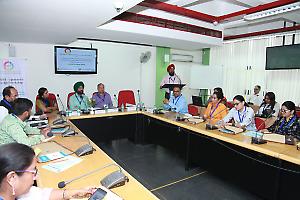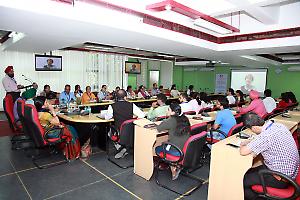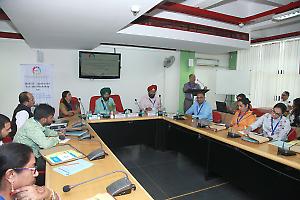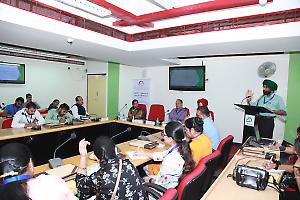By LHorton 2 | December 16, 2019
Data Literacy is a skill needed for researchers and social scientists in the digital age to get the most out of massive data available to us in the digital era today. This was highlighted by Prof. I.V. Malhan, Former Dean, Academics of Central University of Himachal Pradesh, Dharamshala while inaugurating a ‘Workshop on Data Literacy for Researchers in Social Sciences, Administrators and Policy-Makers’ held at MG State Institute of Public Administration, Punjab (MGSIPA) at Chandigarh (India).

This two-day workshop was sponsored by IASSIST and organized jointly by the Department of Library and Information Science (DLIS), Punjabi University, Patiala and MGSIPA. Dr. Jagtar Singh, Professor DLIS and Professor In-charge, Bhai Kahn Singh Nabha Library, Punjabi University, Patiala in his keynote address emphasized that data literacy is one skill set within the whole set of skills and competencies under the umbrella of ‘media and information literacy’ being promoted by UNESCO.
Dr. Singh elaborated on the role of various literacies including data literacy within the broader context of literacy and education, and capacity building and enhancing the capability of researchers.
Ms. Kiran Pandey, Programme Director, Centre for Science and Environment, New Delhi was the Guest of Honour at the Inaugural Session and she spoke on communicating research effectively using data.
Dr. H.P.S. Kalra, Professor and Head, DLIS, Punjabi University, Patiala and a Fellow of the IASSIST gave a brief introduction about the workshop theme and its sponsoring body, the IASSIST.
Prof. Sandra Cannon, President of IASSIST and Associate Vice-Provost for Data Governance and Chief Data Officer at the University of Rochester, USA gave a video message for the participants highlighting the need for research data and their communication in social sciences; and the role IASSIST is playing in this regard.

Earlier, Dr. P. Venkata Rao, Fellow (Knowledge Management) MGSIPA welcomed the participants and resource persons and gave a brief overview of the activities of MGSIPA. Col. Dalbir Singh, GM (Training), MGSIPA proposed a vote of thanks.
Ten sessions were held during this two-day workshop in which 40+ participants from diverse subjects of social sciences and different institutions participated.
After the Inaugural session, Ms Kiran Pandey in her presentation Making data meaningful: why we must be data driven elaborated upon how we can make data meaningful and use in decision making. She also discussed about how data is important for every organizations, researchers and for policymaking.
In another session entitled ‘Finding the right numbers for research, advocacy and impact’ she described various web-based resources which are rich repositories of data that social scientists need, and shared a few examples of how data presented by CSE in its reports and publications is collected.
In the next session, Professor Kalra talked about Data Citation & Documentation and Sources for Authoritative Data and the role of data literacy in finding authoritative data.

Next session was jointly conducted by Professors Jagtar Singh and Kalra and Dr. Rao where five groups of participants were formed. While forming groups diversity of participants was ensured and participants were asked to familiarize with each other in their respective group.
On the second day, Dr. T.C. Goyal, retired from Indian Statistical Service and Mr A.S. Ahluwalia, retired from Indian Economic Service (both now working with MGSIPA) discussed about data analysis and interpretation.
In their second session Dr. Goyal and Mr. Ahluwalia explained in detail about that how we can select the sample and discussed about the hypotheses testing. This was followed by an Open Session for the groups where each groups was asked to select one or two facets of the theme Data Literacy and discuss various issues and dimensions of the facet.
In the next session, each group was asked to make a brief presentation on the discussions carried out by the group and raise pertinent issues to be discussed further. The following facets were covered by the groups:
- Research data management
- Data governance issues
- Data privacy and sovereignty
- Data security
- Data policies
At the end, feedback about the workshop given by three participants which was followed by Valedictory Session in which certificates of participation were given to participants by Col. Dalbir Singh.


